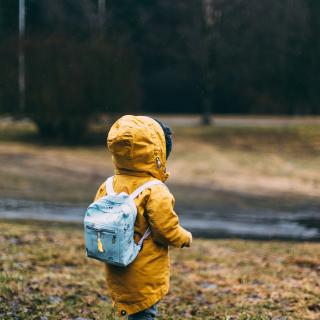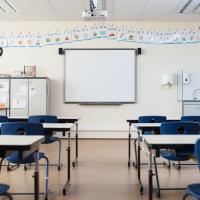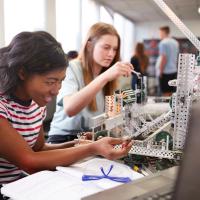Focus On: Our youngest - What future are we preparing them for?

"Children are the living messages we send to a time we will not see." John F. Kennedy
It is a crisp January morning in Lyon, the streets are still and quiet as little Alix, bundled up in her winter coat is headed for her first day at the crèche. In Stockholm, Emil is repeating the numbers, “noll, en, två”, to his grandfather as they head to his förskola. Markus, in Dresden, is looking forward to telling his Krippe playmates about the slope he braved on the sled yesterday, while in Valetta, Eliza is entering her vibrant nursery, giving her dad a quick hug before melting into the crowd of buzzing children. Once the door closes behind them, the journeys these children embark on every day go far beyond play – they are engaging in activities that lay the essential groundwork for their future.
One should not underestimate the critical role that Early Childhood Education and Care (ECEC) plays in shaping the development of young children. Evidence indicates that high-quality ECEC provision plays a significant role in predicting children's educational outcomes, influencing communication, problem-solving and personal-social development, especially for children from less advantageous backgrounds (Davies et al., 2023).
Although in recent years an increasing number of countries give more attention to children’s equal access to ECEC facilities, one quarter of European education systems still lack a national curriculum for pedagogical work with younger children (Key Data on ECEC, 2025). In these cases, curricula focus solely on children aged 3 and over, with governance split between two authorities based on age groups, prioritising care rather than pedagogy for younger children, and education for those from age 3. In these countries, children often face the challenge of adapting to changes in the pedagogical approach, where, as they grow, they transition from care-based to education-based environments. This split can create a disjointed experience for children, with inconsistencies in how care and education are provided.
In many contexts, early childhood care has often been viewed through the prism of promoting the equal status of women in the labour force, and treated as such: care, often with a narrow political focus on looking after children while their parents are busy at work. But the child is also a citizen with rights, a person born with enormous undiscovered potential, and we should view their years spent in ECEC holistically as a launchpad in their lifelong learning process. Education is a right from birth — not just a service. We should ensure that the child is central in building their life experience and view ECEC provision as a “place of encounter between citizens” (Moss, 2021).
One thing is clear, the future depends on children and their learning journeys begin at the crèche and Krippe. There are 25 million children under the age of 6 in the EU, and, without a doubt, every single day they experience is shaping them, not just as individuals, but as members of the society they belong to, influencing the way they will eventually shape the world around them. But what are children like Alix, Emil, Markus and Eliza up to once they let go of the hand of their guardian, and what future are we preparing them for?
The new priorities and the future-proof skill set
The world our children have entered is increasingly competitive, globalised and fast-paced. There is an emphasis on preparing young people for the demands of the labour market they will eventually enter, potentially at the expense of focusing on their individual growth and well-being. As we gaze from the proverbial ECEC launchpad towards what is coming, it is essential to understand the shifting political landscapes and societal priorities that may be influencing how we approach education, including ECEC, in the future.
Researchers argue that the prioritisation of market needs has a harmful effect on the early childhood sector, driven by an emphasis on standardisation, a push-down curriculum, and treating children as future economic assets (Sims, 2017). This model prioritises productivity, competition, and economic outcomes, risking the commodification of the ECEC provision institutions (Moss, 2021). So, the question arises: while defining success by how well children will navigate this competitive environment, can we still emphasise placing equal value on supporting their emotional, social, and intellectual development as individuals in their own right?
We can say with certainty that the world our youngest will inherit is filled with both promise and peril to adapt to. With shifting political and societal values, we are already experiencing relentless technological advancement and an unprecedented change in our climate. Cultivating digital skills, collaboration, creativity, global citizenship and environmental stewardship will be crucial in equipping the children of tomorrow. In this context, early education should build a foundation for these competences, doing a blend of both—preparing them with future-proof skills, while also recognising their intrinsic value as individuals capable of contributing to a changing society in all ways.
The role of digital technologies in early childhood education is a growing topic of debate, while children are already interacting with digital technologies more than ever before (Moses, 2023). While technological tools can enhance children’s imaginative play and aid early language development, concerns remain as early exposure to the internet and screen time raises risks, including hindered social development, reduced attention span, and potential addiction (OECD, 2023; Twenge & Campbell, 2018). While some view children as empowered "digital natives" effortlessly navigating these tools, educators and parents stress on developing technology-related skills outside of screentime through reading, crafting and computing. Digital education is a priority in Europe, with most education systems emphasising age-appropriate methods in early childhood education to develop digital competences, particularly in information literacy and content creation, while promoting cautious use of technology and prioritising offline activities and social interactions (Key Data on ECEC, 2025).
As global awareness of the need for greater sustainability grows, so does the importance of incorporating sustainability into children's educational programs. Most ECEC systems across Europe emphasise fostering environmental awareness and sustainable behaviour in young learners, incorporating sustainability competences aligned with the EU framework. However, the depth and scope of sustainability education vary significantly across countries, with some prioritising it more than others. In Europe, sustainability education is often integrated into ECEC subjects related to natural sciences, global knowledge, and environmental awareness. And while some education systems prioritise it as a core theme, in half of European countries sustainability skills are still not addressed in educational guidelines, especially for children under 3 (Key Data on ECEC, 2025).
From France to Norway, Dresden to Valetta, the daily journeys of children are a powerful reminder: investing in early childhood education is not just an investment in the future of a child, but an investment in the future of society. As we consider the challenges and opportunities within early childhood education and try to predict the future our children will face, we are reminded that the questions we face may outnumber the answers. Yet, this should not be seen as discouraging, but as a call to action. Peter Moss, Emeritus Professor of Early Childhood Provision at UCL, argues that the greatest challenge—and opportunity—lies in reimagining the future we want. By continuously reinventing our approach to early childhood education, always placing the child at its core, we can shape a future that benefits all of us, one that is better, more sustainable and compassionate.
Author: Olga Alexandrova
Editors: Akvile Motiejunaite, Anna Maria Volpe, David Crosier




